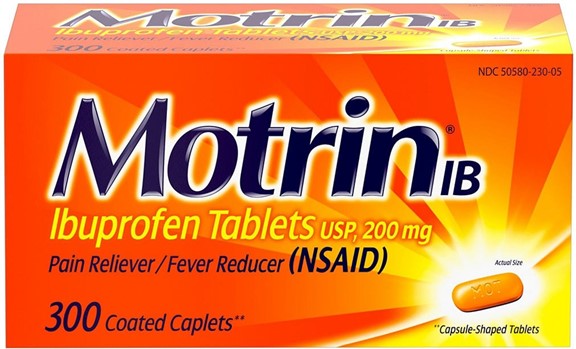A nurse is reviewing a medication reconciliation for an 80-year-old client with renal disease. Which medication should the nurse be most concerned about?
Digoxin.
Levothyroxine.
Motrin.
Tylenol.
The Correct Answer is C

Motrin is a brand name for ibuprofen, which is a nonsteroidal anti-inflammatory drug (NSAID). NSAIDs can cause renal toxicity, especially in older adults and patients with renal disease.
Therefore, the nurse should be most concerned about this medication and its potential adverse effects on the patient’s kidney function.
Choice A is wrong because digoxin is a cardiac glycoside that is used to treat heart failure and atrial fibrillation. Digoxin has a narrow therapeutic index and can cause toxicity if the dose is too high or if the patient has hypokalemia. However, digoxin does not directly affect the kidneys and can be safely used in patients with renal disease if the dose is adjusted according to the patient’s creatinine clearance.
Choice B is wrong because levothyroxine is a synthetic thyroid hormone that is used to treat hypothyroidism. Levothyroxine does not have any major interactions with the kidneys and can be used in patients with renal disease without dose adjustment.
Choice D is wrong because Tylenol is a brand name for acetaminophen, which is an analgesic and antipyretic drug. Acetaminophen does not have any anti-inflammatory effects and does not affect the kidneys at therapeutic doses. However, acetaminophen can cause hepatotoxicity if the dose exceeds 4 g per day or if the patient has liver disease or alcohol abuse.
Nursing Test Bank
Naxlex Comprehensive Predictor Exams
Related Questions
Correct Answer is A
Explanation
Formed stool two times per day, every day, for one week. This indicates that bowel training is attaining the desired outcome because it shows regularity and consistency of bowel movements without the use of laxatives or enemas.
Choice B is wrong because soap sud enemas are not recommended for bowel training as they can irritate the bowel and cause fluid and electrolyte imbalance.
Choice C is wrong because continued use of laxatives can inhibit the natural defecation reflexes and cause dependency.
Choice D is wrong because a formed, soft stool at regular intervals without the use of a laxative is a normal defecation pattern, not an indication of fecal incontinence.
Correct Answer is A
Explanation
Notify the health care provider to report and anticipate new orders.
This is because an oral temperature of 100.8° F (38.2° C) indicates a fever, which could be a sign of infection or inflammation in an elderly client.
A fever of this magnitude could also cause dehydration, confusion, or seizures in older adults.
Therefore, the nurse should notify the health care provider as soon as possible to determine the cause and treatment of the fever.
Choice B is wrong because covering the client with an additional blanket could increase the body temperature and worsen the fever.
The UAP should not recheck the temperature in two hours, but rather monitor it more frequently and report any changes to the nurse.
Choice C is wrong because charting the temperature on the vital signs sheet and reporting to the new shift coming on is not enough to address the urgency of the situation.
The nurse has a responsibility to act on abnormal findings and communicate them to the health care provider.
Choice D is wrong because assessing the client’s temperature rectally and comparing the results is not necessary and could cause discomfort or injury to the client.
Rectal temperatures are usually higher than oral temperatures by about 0.5° F (0.3° C), so this would not change the interpretation of the fever.
The normal range for oral temperature in adults is 97.6° F to 99.6° F (36.4° C to 37.6° C).
Whether you are a student looking to ace your exams or a practicing nurse seeking to enhance your expertise , our nursing education contents will empower you with the confidence and competence to make a difference in the lives of patients and become a respected leader in the healthcare field.
Visit Naxlex, invest in your future and unlock endless possibilities with our unparalleled nursing education contents today
Report Wrong Answer on the Current Question
Do you disagree with the answer? If yes, what is your expected answer? Explain.
Kindly be descriptive with the issue you are facing.
